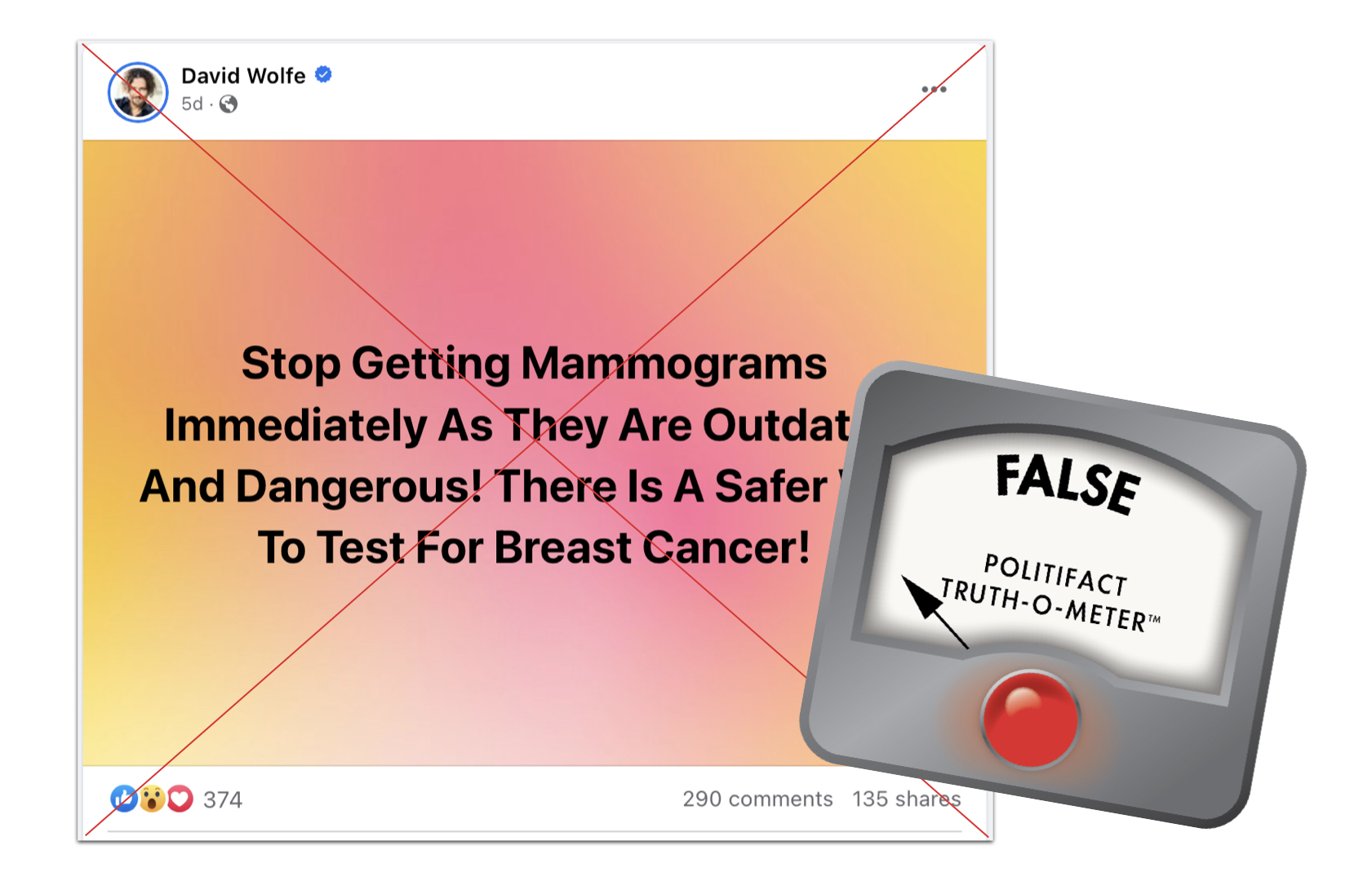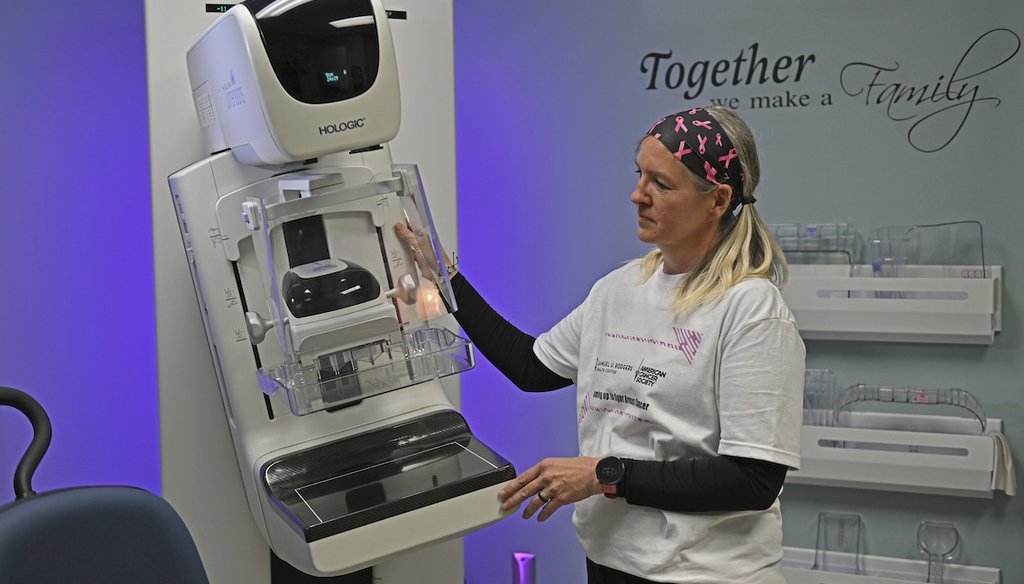

Our only agenda is to publish the truth so you can be an informed participant in democracy.
We need your help.


Renee Jeria, the imaging manager, shows the working of the mammography screening machine at the Samuel U. Rodgers Health Center on April 25, 2023 in Kansas City, Mo. (AP)
Experts and organizations including The American Cancer Society, The American College of Obstetricians and Gynecologists, the National Comprehensive Cancer Network and the U.S. Preventive Services Task Force recommend mammograms to screen for breast cancer.
We did not find credible guidance advising against mammograms.
Mammography has drawbacks including false positives or the risk of unnecessary procedures, but experts disputed the idea that thermography screening alone has proved safer or more effective at detecting breast cancer.
Mammograms, or X-ray pictures of breasts, have been a recommended breast cancer screening method for decades, but a post on social media suggested that mammograms are unsafe.
"Stop Getting Mammograms Immediately As They Are Outdated And Dangerous!" read David Wolfe’s July 11 Facebook post. "There Is A Safer Way To Test For Breast Cancer!"
Wolfe is a social media influencer known for promoting diets and conspiracy theories. Wolfe has repeatedly shared false medical information, including the debunked claim that vaccines cause autism. He did not respond to PolitiFact’s request for comment.
In a comment on his Facebook post, Wolfe shared the link to an article on a website called Green Living Tribe. (It appears Wolfe copied the article’s headline verbatim.) The article argued that recent research suggests mammograms are riskier than once thought and that thermography is "a safer alternative that can effectively test for breast cancer."
Wolfe’s post was flagged as part of Meta’s efforts to combat false news and misinformation on its News Feed. (Read more about our partnership with Meta, which owns Facebook and Instagram.)

(Screenshot from Facebook.)
Experts and cancer-preventing organizations recommend mammograms to screen for breast cancer, with some differences on timing. The American Cancer Society, The American College of Obstetricians and Gynecologists, the National Comprehensive Cancer Network and the U.S. Preventive Services Task Force all recommend mammogram screening for breast cancer.
"Screening mammograms lead to earlier stage at diagnosis and earlier-stage cancers have a better prognosis, can reduce the treatment needed and improve quality of life," said Dr. Eleonora Teplinsky, head of breast and gynecologic medical oncology at Valley-Mount Sinai Comprehensive Cancer Care.
Dr. Skyler B. Johnson, an assistant professor of radiation oncology at the University of Utah Huntsman Cancer Institute, and Teplinsky said they weren’t aware of experts or cancer-preventing organizations that have advised against mammograms, despite what Wolfe’s post suggested.
"However, there can be differing recommendations among organizations regarding the starting age and frequency of mammograms, as well as considerations for individual risk factors, where additional/other imaging or diagnostic tools may be recommended," Johnson said.
Teplinsky said that doctors might add additional imaging such as ultrasounds or MRIs for people who are at higher risk for breast cancer. She said that the Preventive Services Task Force — a volunteer group of health care experts who make evidence-based recommendations about clinical preventive services such as screening tests — recently published a draft update to their breast cancer screening recommendations.
Since January 2016, the Task Force has recommended women ages 50 to 74 have mammograms every other year. The May draft recommendation proposed lowering the initial screening age to 40.
Experts told PolitiFact that mammography is not without risks and drawbacks, but they disputed the idea that thermography has proved safer or more effective at detecting breast cancer.
The Green Living Tribe article said mammograms can lead to false positives and unnecessary diagnostic procedures or surgeries that cause harm and emotional distress.
"Yes, there are false positives that may cause anxiety and stress but at the same time, every screening test will have a false positive," Teplinsky said.
She also said that, in an effort to reduce unnecessary surgeries, research is underway to determine which cancers will pose a problem in the future and which will not.
The Green Living Tribe article suggests thermography is an effective, high-accuracy alternative to mammography. The article referred to a 2008 study published in The American Journal of Surgery that evaluated how effective digital infrared thermal imaging, or thermography, was at detecting malignant breast cancer. In the study, 60 of 94 biopsies were malignant and 34 were benign. Digital infrared thermal imaging conducted on those patients successfully identified 58 of the 60 malignancies.
The article concluded that thermography was "a valuable adjunct to mammography and ultrasound, especially in women with dense breast parenchyma."
But available research does not show thermography should replace mammography, experts said.
Johnson said the general idea behind thermography is that breast cancer has increased thermal activity that can be detected with infrared cameras. But there is no evidence that thermography is safer or more effective than mammography, he said.
In 2021, the U.S. Food and Drug Administration issued a statement, saying it had received reports of information circulating that could mislead patients "into believing thermography, a type of test that shows patterns of heat on or near the surface of the body, is a proven alternative to mammography. But the FDA is not aware of any scientific evidence to support these claims."
The FDA cautioned that people who rely only on thermography screenings instead of mammograms "may miss the chance to detect breast cancer at its earliest stage."
The FDA has approved thermography devices only as tools for use alongside a primary screening test such as mammography, it said.
"You can see false positive rates in thermography as well," Teplinsky said.
A Facebook post said, "Stop getting mammograms immediately as they are outdated and dangerous" and suggested thermography was a safer alternative for detecting breast cancer.
The American Cancer Society, The American College of Obstetricians and Gynecologists, the National Comprehensive Cancer Network and the U.S. Preventive Services Task Force all recommend mammograms to screen for breast cancer. Experts told PolitiFact that they weren’t aware of experts or cancer-preventing organizations that have advised against mammograms, despite what the post suggested.
Mammography is not without risks and drawbacks, but experts rebutted the idea that thermography screening alone has proved safer or more effective at detecting breast cancer.
We rate this claim False.
PolitiFact researcher Caryn Baird contributed to this report.
Facebook post, July 11, 2023
Email interview with Dr. Skyler B. Johnson, assistant professor of radiation oncology at the University of Utah Huntsman Cancer Institute, July 13, 2023
Email interview with Dr. Eleonora Teplinsky, head of breast and gynecologic medical oncology at Valley-Mount Sinai Comprehensive Cancer Care, July 14, 2023
GreenLivingTribe, Stop getting mammograms immediately as they are outdated and dangerous! There is a safer way to test for breast cancer! accessed July 13, 2023
American Cancer Society, History of ACS recommendations for the early detection of cancer in people without symptoms, accessed July 13, 2023
American Cancer Society, American Cancer Society recommendations for the early detection of breast cancer, updated Jan. 14, 2022
BreastCancer.org, Mammography: benefits, risks, What you need to know, June 15, 2023
Medical News Today, Mammograms and cancer: Is there a connection? Sept. 9, 2021
National Cancer Institute, Addressing the challenges of cancer misinformation on social media, Sept. 9, 2021
PubMed Central, Thermography as a breast cancer screening technique: a review article, Nov. 14, 2022
U.S. Centers for Disease Control and Prevention, What is breast cancer screening? Updated Sept. 26, 2022
U.S. Preventative Services Task Force, Breast cancer: Screening, Jan. 11, 2016
U.S. Preventative Services Task Force, Breast cancer: Screening - an update for this topic is in progress, updated April 24, 2023
U.S. Preventative Services Task Force, Draft recommendation statement breast cancer: screening, May 9, 2023
Weill Cornell Medical College, Effectiveness of a noninvasive digital infrared thermal imaging system in the detection of breast cancer, Oct. 1, 2008
The West Australian, Protest over anti-vaxxer’s Perth talk, Feb. 28, 2017
ABC News, Pro-vaccination campaigners concerned about David 'Avocado' Wolfe's sellout event, March 15, 2017
PolitiFact, 5 facts about vaccines, Nov. 1, 2019
Forbes, A new year's resolution for science advocates: don't cry Wolfe, Jan. 1, 2016
The American College of Obstetricians and Gynecologists, Breast cancer risk assessment and screening in average-risk women, published July 2017
National Comprehensive Cancer Network, Breast cancer screening and diagnosis 2022, June 2022
The Agency for Healthcare Research and Quality, U.S. Preventive Services Task Force, accessed July 14, 2023
U.S. Food and Drug Administration, Breast cancer screening: Thermogram no substitute for mammogram, Jan. 13, 2021
U.S. Centers for Disease Control and Prevention, What is a mammogram? accessed July 13, 2023
National Library of Medicine, Comparison of the accuracy of thermography and mammography in the detection of breast cancer, August 2016
The University of Texas MD Anderson Cancer Center, Mammograms vs. thermography: What you need to know, Oct. 23, 2020
In a world of wild talk and fake news, help us stand up for the facts.
